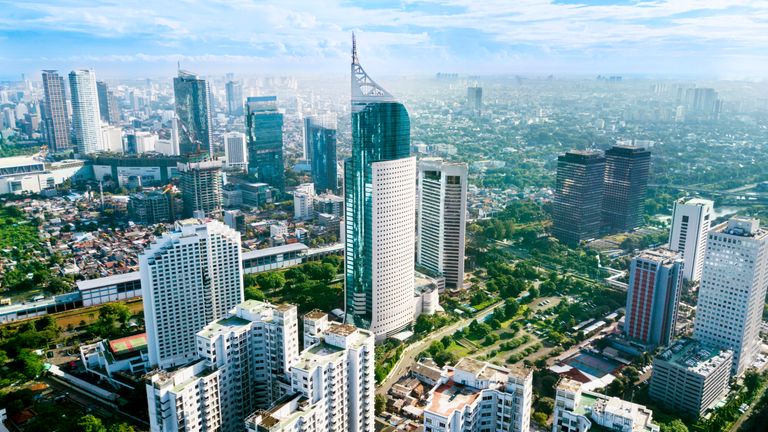Indonesia to remove 'burden' from sinking Jakarta with new capital on Borneo
The location was chosen as it has a low risk of flooding, earthquakes, forest fires, tsunamis and volcanic eruptions.
Indonesia is moving its capital from the polluted,
overcrowded and sinking city of Jakarta to a sparsely populated region
on the island of Borneo, famous for its rainforests and orangutans.
President Joko Widodo said three years of intense study saw officials identify the province of East Kalimantan on the eastern side of the island as the ideal location.
The island is the third largest in the world and is at the centre of the archipelago nation, with the move expected to take up to 10 years and cost $32.5bn (£26.5bn).
Most of the move will be funded by cooperation between the government and businesses and by direct investment by state-run firms. Some 19% will come from the government budget.
President Widodo said the city, which is yet to be named, already has relatively complete infrastructure with it being near the cities of Balikpapan and Samarinda.
He said the burden on Jakarta had become too much, with it being home to the government, the country's largest seaport and airport, and the centre for finance, trade and business.
The decision was made to move the capital from the island of Java
because the government wants to spread the country's wealth and
population.
As it is, 54% of the country's 270 million-strong population live on Java, making it by far the most densely populated area in Indonesia.
Mr Widodo told reporters: "We couldn't continue to allow the burden on Jakarta and Java island to increase in terms of population density.
"Economic disparities between Java and elsewhere would also increase."
Last month, the leader said he wanted to separate the centre of government from the county's business hub in Jakarta, which is home to 30 million people if its greater metropolitan area is included.
The city is prone to earthquakes and flooding and is sinking due to the uncontrolled extraction of ground water.
Congestion costs the country's economy $6.5bn (£5.3bn) each year, according to estimates.
The new East Kalimantan location was once almost covered completely by rainforests but illegal logging has removed much of its original growth. Just 3.5 million people live there and it is surrounded by the Kutai National Park, which is known for its orangutans.
President Widodo said experts chose the location as it carried minimal risk of flooding, earthquakes, forest fires, tsunamis and volcanic eruptions.
He said his government was still drafting a law on the new capital, which will have to be passed by the country's parliament.
President Joko Widodo said three years of intense study saw officials identify the province of East Kalimantan on the eastern side of the island as the ideal location.
The island is the third largest in the world and is at the centre of the archipelago nation, with the move expected to take up to 10 years and cost $32.5bn (£26.5bn).
Most of the move will be funded by cooperation between the government and businesses and by direct investment by state-run firms. Some 19% will come from the government budget.
President Widodo said the city, which is yet to be named, already has relatively complete infrastructure with it being near the cities of Balikpapan and Samarinda.
He said the burden on Jakarta had become too much, with it being home to the government, the country's largest seaport and airport, and the centre for finance, trade and business.
As it is, 54% of the country's 270 million-strong population live on Java, making it by far the most densely populated area in Indonesia.
Mr Widodo told reporters: "We couldn't continue to allow the burden on Jakarta and Java island to increase in terms of population density.
"Economic disparities between Java and elsewhere would also increase."
Last month, the leader said he wanted to separate the centre of government from the county's business hub in Jakarta, which is home to 30 million people if its greater metropolitan area is included.
The city is prone to earthquakes and flooding and is sinking due to the uncontrolled extraction of ground water.
Congestion costs the country's economy $6.5bn (£5.3bn) each year, according to estimates.
The new East Kalimantan location was once almost covered completely by rainforests but illegal logging has removed much of its original growth. Just 3.5 million people live there and it is surrounded by the Kutai National Park, which is known for its orangutans.
President Widodo said experts chose the location as it carried minimal risk of flooding, earthquakes, forest fires, tsunamis and volcanic eruptions.
He said his government was still drafting a law on the new capital, which will have to be passed by the country's parliament.


